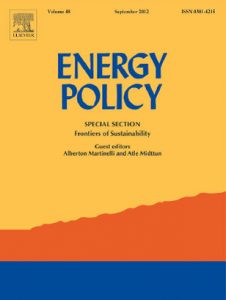 Municipalities aiming at mitigating climate change by implementing new energy efficiency technologies face budgetary and capacity constraints. Outsourcing through energy service contracting could provide a solution. This paper reports results from a survey of 1298 municipalities concerning barriers to retrofitting public street lighting and the possible role of energy service contracting to overcome these barriers. Using a logistic regression analysis, the authors investigate determinants of opting for energy service contracts in the specific context of LED retrofits. Results point to an advantage of outsourcing in a financially and capacity-constrained environment, which corresponds with the main reasons for engaging in contracting: minimising investments and financial risks. However, municipalities often do not fully grasp the risks associated with retrofitting especially using a novel technology such as LED. In relation to that they underestimate the risk reduction potential of energy performance contracts (EPC). Previous experience with outsourcing increases the probability to engage in servitization although certain existing partnerships, particularly with utilities, prevent municipalities from considering energy performance contracts. Interestingly, engaging an energy consultant has a negative propensity to use energy service contracts, while pre-negotiated standardised contracts for energy performance contracts have a positive influence.
Municipalities aiming at mitigating climate change by implementing new energy efficiency technologies face budgetary and capacity constraints. Outsourcing through energy service contracting could provide a solution. This paper reports results from a survey of 1298 municipalities concerning barriers to retrofitting public street lighting and the possible role of energy service contracting to overcome these barriers. Using a logistic regression analysis, the authors investigate determinants of opting for energy service contracts in the specific context of LED retrofits. Results point to an advantage of outsourcing in a financially and capacity-constrained environment, which corresponds with the main reasons for engaging in contracting: minimising investments and financial risks. However, municipalities often do not fully grasp the risks associated with retrofitting especially using a novel technology such as LED. In relation to that they underestimate the risk reduction potential of energy performance contracts (EPC). Previous experience with outsourcing increases the probability to engage in servitization although certain existing partnerships, particularly with utilities, prevent municipalities from considering energy performance contracts. Interestingly, engaging an energy consultant has a negative propensity to use energy service contracts, while pre-negotiated standardised contracts for energy performance contracts have a positive influence.
Tags
barriers to innovation bibliography management cleantech diversity divestment dynamic capabilities educate-it energy performance contracting energy services Entrepreneurship Finance financial sector financing innovation free software human resources innovation innovation intermediaries institutional investors Institutions International investments investor motivation local energy transition low-carbon low-carbon innovation management matching modes of governance policy instruments Post-socialism public policy regulation renewable energy research research communication research tools resilience Social Entrepreneurship social networks stakeholder sustainable energy teaching 2.0 teaching tools transition venture capital
